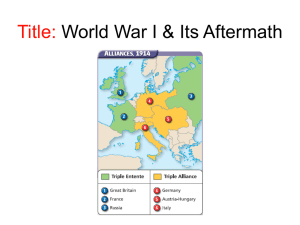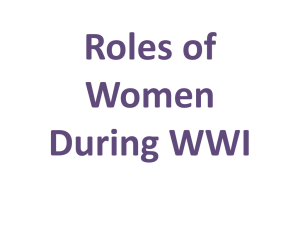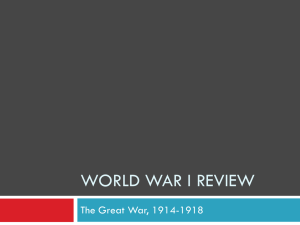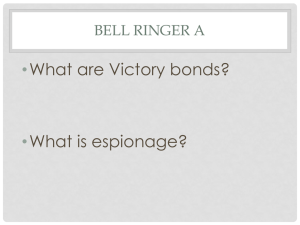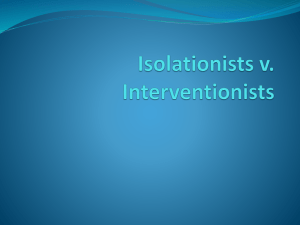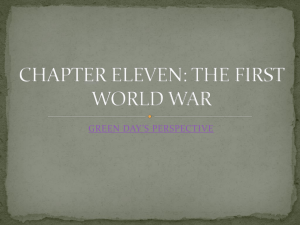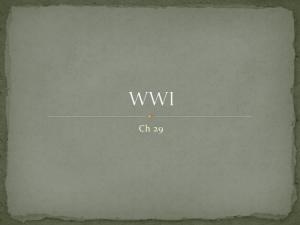Ch. 12 – World War I
advertisement
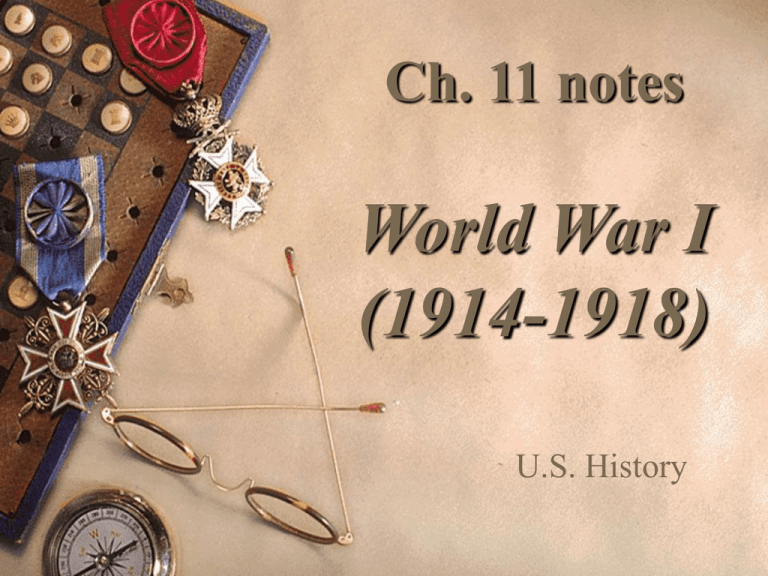
Ch. 11 notes World War I (1914-1918) U.S. History Assassination of Archduke Ferdinand June 28, 1914. Franz Ferdinand of AustriaHungary killed w/ his wife in the city of Sarajevo by a Serbian nationalist named Gavrilo Princip. Event that marked the beginning of WWI. Causes of WWI Nationalism – extreme pride in one’s own ethnic group/nation. Militarism – industrial revolution allowed for creation of powerful weapons & organization of large armies. Imperialism – competition to gain colonies and control weaker nations (profit $$ & power). Secret Alliances – European nations entangled in secret treaties & alliances to defend each other. Causes of WWI Central Powers – Austria-Hungary, Germany, Ottoman Empire (and Italy – changed sides in 1916) Allied Powers – France, Great Britain, Russia, and later United States (and Serbia – small, insignificant) Europe in WWI Causes of WWI Mobilization of Alliances Aust.-Hung, blamed Serbia for assassination of Archduke. Demanded full access to Serbian government files. Serbia refused to comply. 1) Aust.-Hung declares war on Serbia. 2) Russia mobilizes army to defend Serbs. 3) France joins Russia. 4) Germany mobilizes to aid Aust-Hung and declares war on Russia & France. Causes of WWI Invasion of Belgium August 4, 1914 Germany invades Belgium on its way to France. Great Britain ally w/ France, they also declared war on Germany in Aug. 1914. Secret Alliances soon brought other European countries into war. Reasons for U.S. Involvement Supplying the Allies President Woodrow Wilson called for U.S. to remain neutral. Strong economic ties made neutrality almost impossible. Allies counted on U.S. for supplies. Many Americans sympathetic to Allies – shared a common heritage w/ Great Britain. Reasons for U.S. Involvement British Naval Blockade 1914-1915 Great Britain set up a naval blockade in the North Sea to cut trade w/ the Central Powers. Hoped to starve Germans & Austrians into surrendering. German U-boats (submarines) Fire Germans began sinking any ship found in blockade zone, even passenger ships. Lusitania – May, 1915. U-boats sank British passenger ship. 128 Americans drowned. Outraged U.S. Reasons for U.S. Involvement Zimmerman Telegram Sent by Germany to Mexico in 1916, but British intercepted it. Germany asked Mexico for assistance in the war. (If Allies were defeated, Mexico would regain the southwestern United States.) President Wilson outraged, ordered American ships to shoot U-boats on sight. Reasons for U.S. Involvement Declaration of War German U-boats declared unrestricted submarine warfare on all ships found in the ocean. March 1917 - Revolution in Russia overthrows the czar. Loss of Russia for the Allies made participation by U.S. crucial. April 2, 1917 U.S. declares war on Germany. “We must make the world safe for democracy.” – President Wilson Role of U.S. Government during WWI U.S. federal government increased control over nation during World War I. Necessary to raise an army, finance war effort, encourage public support of war. Role of U.S. Government during WWI Selective Service Act (1917) – U.S. needed to raise an army. Required men to register for military draft at 21 yrs old (or older). War Industries Board (WIB) – U.S. short on supplies early in the war. WIB to increase production and control limited resources (food, oil, etc.) Role of U.S. Government during WWI Financing the War – U.S. government organized Liberty Bond and Victory Loan drives to raise $ for the war effort. Held rallies, parades, etc. – Americans felt patriotic for doing their part. Role of U.S. Government during WWI Feeding the Allies – Top needs were wheat, pork, sugar. Americans cut back to save food. Also grew vegetables in “victory gardens” in school playgrounds, backyards, etc. – Americans tripled amount of food sent to the Allies! Role of U.S. Government during WWI Attacks on Civil Liberties U.S. govnt passed war-time laws to limit criticism of the war effort. – Espionage Act (1917) – illegal to “interfere” w/ war effort. – Sedition Act (1918) “disloyal” language about U.S. illegal. – Anti-immigrant hysteria against GermanAmericans. Some lost jobs, beaten, etc. Role of U.S. Government during WWI Role of Women – Thousands joined workforce to replace drafted men. Others worked as military nurses, etc. – Helped to gain public support for women’s suffrage. (19th amendment passed in 1920) Fighting in WWI American Troops (“doughboys”) – Wilson selected General John J. Pershing to lead U.S. troops, known as the American Expeditionary Force. Conditions of War – Soldiers fought in 25,000 miles of muddy trenches that crisscrossed Europe. Trenches mostly on Western and Eastern Fronts No glory or heroics. Fighting in WWI New Weapons – Gave advantage to the defense. Little ground gained. – Rapid-fire machine guns, U-boats, Mustard gas, Tanks, Airplanes, Barbed wire across “No Man’s Land” Fighting in WWI Battle of Argonne Forest – Sept. 1918 – American troops began major offensive against German in Argonne forest. Tide of war turned as Germans began retreating! Armistice (cease-fire) – November 11, 1918 – German delegates signed a ceasefire in a converted railroad car in Paris. WWI was over. End of WWI President Wilson’s Plan for World Peace Named the “Fourteen Points Plan” – open treaties, freedom of the seas, free trade, arms reduction, self-determination (national groups had right to their own territory and selfgovernment) Most important part of plan included a League of Nations (to settle disputes and prevent future wars). End of WWI Treaty of Versailles Peace treaty of WWI. “War Guilt” clause - Germany is responsible for entire war, must pay reparations (damages), disarm (no military), lost territory. New nations of Poland, Yugoslavia, and Czechoslovakia were created and carved out of Austria-Hungary, Germany, and Russia. End of WWI Defeat of Treaty of Versailles Congress thought League of Nations would entangle U.S. in another war. U.S. rejected & refused to sign Treaty of Versailles in November 1919. End of WWI Conclusion… WWI called “The Great War”. Did more destruction than any other war in history. Treaty of Versailles set stage for international problems that led to World War II!
